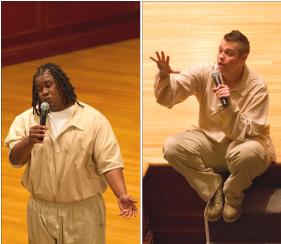
By Tyler McCormick
Correspondent
A criminal record is permanent, and on March 23, four New Jersey inmates drove that point home.
The inmates spoke in the Mildred and Ernest E. Mayo Concert Hall as part of Project P.R.I.D.E. (Promoting Responsibility In Drug Education), a program of the New Jersey Department of Corrections.
Michael Ritter, the coordinator of Project P.R.I.D.E. and College alumnus, introduced the inmates, who discussed prison life and “the things that will get you there.” The inmates, dressed in tan jumpsuits, all volunteered to participate in Project P.R.I.D.E.
According to the inmates, all of your personal belongings are taken away when you are incarcerated. You are then issued state clothing and you are not allowed to have “anything.”
The first inmate to speak was a 22-year-old named Nicole who was arrested at age 19. Her last name, like those of the other inmates, was not disclosed. She was sentenced to a three-year prison term for a drunk-driving incident that resulted in the death of a 37-year-old man.
Nicole, who attended a private Catholic high school, never expected to be in prison. She admits to making a “bad split-second decision.”
Nicole said that several life experiences led to her abuse of alcohol. Her parents divorced when she was 14 years old, and she began drinking soon after. She said she “blacked out” many times during high school and was known as a “party girl.”
Once she had a car, she says she had “a new sense of independence.” When she was 17, Nicole began dating a 29-year-old cocaine dealer.
On the night of the incident, Nicole drank a bottle of wine. Only five minutes away from home, she decided to get in her car and drive.
Nicole lost control of her car, killing another person. She suffered a broken femur and needed three surgeries and four blood transfusions, as well as a three-year sentence.
“It’s been four years, but it feels like it happened yesterday,” she said, admitting that the guilt still haunts her. The night of the incident was the first time Nicole ever drove

under the influence.
“I can’t take it back. I can’t make it better,” she said. “I have nothing to show from it besides a criminal record.”
George, the second speaker, was arrested at age 17 for robbery and was prosecuted as an adult.
“A lot of people are in jail for stupid reasons,” he said.
He said that his father was a “good man” who drank at the end of a hard day to “take the edge off.” George saw this behavior as a symbol of manhood.
George, who would have graduated from high school in 2006, is sentenced to six years in prison.
“No matter how hard I work, my record will always follow me,” he said.
George said that jail food is terrible. Referring to the meal he had in Eickhoff Hall, he said, “That was the best meal I have had in four and a half years.”
Jocelyn was arrested three years ago at the age of 32 and received a three-year sentence.
She was a successful highschool basketball player and quit when she was 16 years old. She says that she had a picture-perfect childhood on the outside, but in reality, there were problems within her family.
Jocelyn went to private school until high school when she started drinking, using drugs and hanging out with the wrong people. She went to culinary school and landed a job in Manhattan making $100,000 per year, but she also became a part of the drug scene at New York City night clubs.
“I was very arrogant” she said. She admits that she just wanted to have fun. Soon, Jocelyn became a cocaine addict.
“You could never tell me that this would have happened to me,” she said.
Jocelyn’s addiction eventually led to stealing.
“You own your destiny right now,” she said. “It’s not a matter of chance, it’s a matter of choice.”
The fourth and final inmate to speak was Stanley, who was arrested for gang-related activity. He is currently serving a 13-year sentence.
He admits that he did not come from the best of homes and experienced abuse as a child. At age 12, he ran away from home with his younger brother. He started selling drugs as a way to earn a living and ended up joining a gang.
“I put myself here,” he said. “It’s my mistake.”
The discussion was followed by a question-and-answer session. The main message of the Project P.R.I.D.E. inmates, indicated by a sign that hung before the speakers, is: “The worst thing that you can do is to establish a criminal record. Avoid it at all costs.”
Project P.R.I.D.E. is a community-outreach program sponsored by the New Jersey Department of Corrections which aims to spread awareness of the prison system, promote responsible citizenship and reduce the appeal of drug and alcohol use. The program is sponsored by The Center for Prison Outreach and Education.






